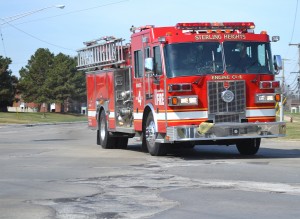Last night the Senate voted out a road funding plan that could ultimately raise $1.5 billion for roads, with two of the main pieces of legislation in the plan coming to a tie on the chamber floor.
The plan generates roughly $822 million by increasing the gas tax 15 cents and $700 million from unspecified General Fund budget cuts.
Eight bills — SB 0414, HB 4610, HB 4611, HB 4612, HB 4613, HB 4614, HB 4615 and HB 4616 — were passed through the Senate, but two of the main pieces of legislation were only moved after Lt. Gov. Brian CALLEY broke the tie.
Under HB 4615, the gas tax would go up 19 cents to 23 cents on Oct. 1, 2015; to 27 cents on Jan. 1, 2016, and 34 cents on Jan. 1, 2017, raising $475 million more for the roads in Fiscal Year (FY) 2016, $733 million in FY 2017 and $822.1 million in FY 2018, according the Senate Fiscal Agency (SFA).
The also also creates a lock box directing seven cents of the 15-cent gas tax increase to a fund controlled by the Department of Treasury that could only be spent after approval is given by joint resolutions of the House and Senate.
Under SB 414, a $350 million General Fund allocation would be made toward roads in Fiscal Year (FY) 2017 and a $700 million special roads allocation that would take place going forward until FY 2033.
The bill also includes a mechanism that would roll back the state’s income tax if General Fund revenue exceeds the rate of inflation. Every .1 percent that is rolled back from the state’s 4.25 percent income tax would equate to an additional $230 million reduction in the the state’s General Fund.
HB 4613 would require warranties, where possible, on all road projects over one million dollars. Additionally, this bill contain 23 new reporting requirements that local units of government must provide to MDOT.
The bottom line is that this plan does not provide a long-term sustainable solution to address Michigan’s deteriorating infrastructure. Additional earmarks from the General Fund and only allowing the General Fund to grow by inflation could severely affect the ability of the state to prioritize investment in communities that desperately need it. It could result in future cuts to revenue sharing, K-12, higher education, community colleges, economic development, PILT, fire protection grants, or state police.
The League will be working hard to ensure our voice is heard on the potential long-term negative impacts this proposal could have on our communities. We will continue to update you on the advancement of this proposal and how you can engage members of the Legislature in the coming days.
John LaMacchia is a Legislative Associate for the League handling transportation, infrastructure, and energy issues. He can be reached at jlamacchia@mml.org or 517-908-0303 .
.



